Yorkshire Terrier Breed Breakdown: Everything You Need to Know
Are you thinking about adding a Yorkshire Terrier to your family? These tiny, energetic dogs pack a lot of personality into a small package.
Yorkshire Terriers, often affectionately known as Yorkies, have become one of the most popular toy breeds worldwide.
But what makes them so special? Let’s dive into everything you need to know about the Yorkshire Terrier breed.
History of the Yorkshire Terrier
The Yorkshire Terrier, or Yorkie, has its origins in the 19th century in England. Originally bred to catch rats in clothing mills, these dogs were prized for their tenacity and small size.
Over time, their charming looks and lively temperament caught the eye of the upper class, transitioning them from working dogs to fashionable companions.
By the late 19th century, the breed was recognized by major kennel clubs, solidifying its place in canine history.
Physical Characteristics
Yorkshire Terriers, commonly known as Yorkies, are celebrated for their distinct and elegant appearance. They have a petite, well-proportioned body that exudes both charm and agility. Despite their small stature, Yorkies possess a robust and sturdy frame, reflecting their tenacious spirit.
Their expressive eyes and perky ears add to their lively and intelligent look. The breed’s physical traits, combined with their energetic personality, make them stand out as one of the most beloved toy breeds.
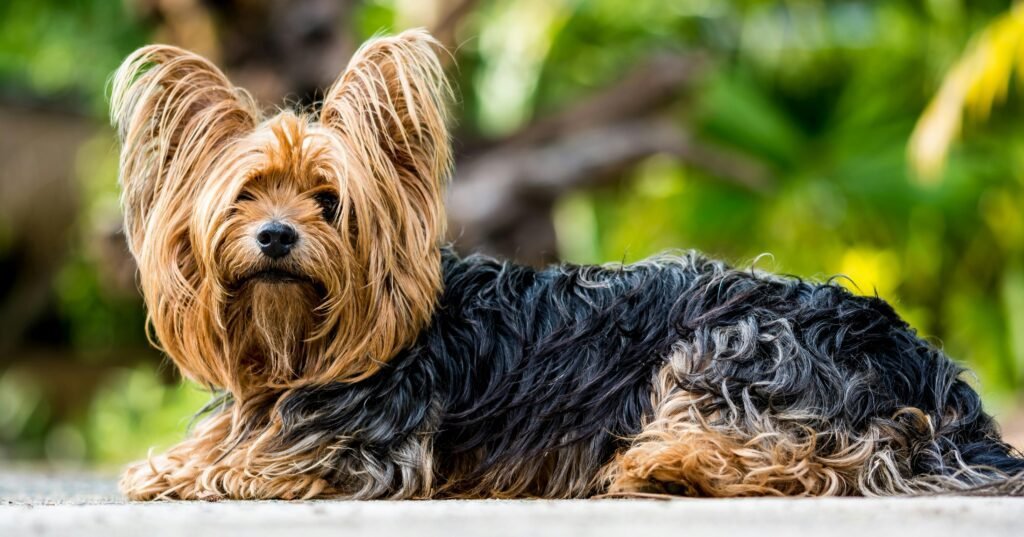
Size and Weight
Yorkshire Terriers are small dogs, typically weighing between 4 to 7 pounds. They stand about 7 to 8 inches tall at the shoulder. This compact size makes them ideal for apartment living and easy to carry around.
Despite their small size, Yorkies are known for their feisty and confident nature, often acting as if they are much larger dogs. Their lightweight build also means they are agile and quick, traits that are remnants of their history as ratters.
Coat and Colors
The coat of a Yorkshire Terrier is one of its most defining features. It is long, silky, and straight, often compared to human hair. The typical coloration for Yorkies is a striking combination of blue and tan, with the blue running along their back and the tan on their face, chest, and legs.
This luxurious coat requires regular grooming to maintain its beauty and prevent tangles. Some owners opt for a shorter “puppy cut” to reduce maintenance, but even then, regular brushing is necessary.
Distinctive Features
Yorkies have several distinctive features that set them apart. Their small, V-shaped ears stand erect and contribute to their alert and inquisitive expression. Their eyes are dark and sparkling, full of intelligence and curiosity.
The Yorkshire Terrier’s compact, well-proportioned body is complemented by a level back and a tail that is typically carried slightly higher than the back. Their overall appearance is one of elegance and refinement, coupled with a hint of the spunky attitude that makes them so endearing.
Temperament and Personality
Yorkshire Terriers are renowned for their spirited and bold temperament, packed into their small frames. They exude confidence and possess a lively disposition that makes them captivating companions.
Yorkies are intelligent, alert, and eager to interact with their surroundings, often displaying a curious and inquisitive nature. Their big personalities and affectionate nature make them endearing to their owners, providing endless joy and entertainment.
General Disposition
The general disposition of a Yorkshire Terrier is marked by its feisty, courageous, and affectionate nature. Despite their small size, they have a big-dog attitude, often displaying a fearless approach to life.
Yorkies are also highly intelligent and quick learners, making them responsive to training and eager to please their owners. Their playful and energetic behavior makes them delightful companions, always ready for an adventure or a game.
Interaction with Families
Yorkshire Terriers thrive on human interaction and are known for forming strong bonds with their families. They are loyal and affectionate, often following their owners around the house and seeking their attention.
Yorkies enjoy being part of family activities and can be quite the little entertainers with their playful antics. They are also sensitive to their owners’ emotions and can be very comforting and attentive pets.
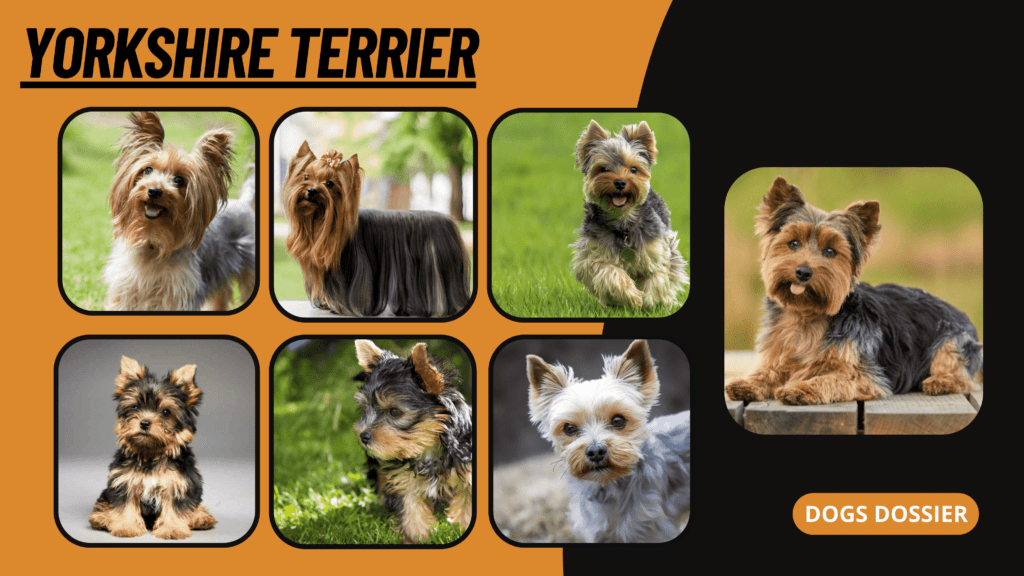
Suitability for Children and Other Pets
Yorkies can be suitable for families with children, particularly older children who understand how to handle small dogs gently. Their small size makes them vulnerable to rough play, so supervision is recommended.
When it comes to other pets, Yorkies generally get along well with other dogs and can coexist peacefully with cats if properly socialized from an early age. However, their bold nature means they may try to assert dominance, so early socialization and training are crucial to ensure harmonious relationships.
Health and Lifespan
Yorkshire Terriers are generally healthy dogs, but like all breeds, they can be prone to certain health issues.
Understanding these potential problems and providing preventative care can help ensure your Yorkie lives a long, happy, and healthy life. With proper care, these delightful dogs can be cherished companions for many years.
Common Health Issues
Yorkies can be prone to several common health issues, including dental problems due to their small mouths, which can lead to overcrowded teeth and gum disease. Patellar luxation, a condition where the kneecap slips out of place, is also common.
Additionally, they may suffer from tracheal collapse, where the windpipe partially collapses, causing coughing and breathing difficulties. Regular veterinary check-ups and awareness of these conditions can help manage and prevent serious health problems.
Lifespan Expectations
The average lifespan of a Yorkshire Terrier ranges from 12 to 15 years, with many Yorkies living even longer with proper care. Their longevity is one of the many appealing aspects of the breed, allowing for a long-term companionship.
Maintaining a healthy diet, regular exercise, and routine veterinary care are key factors in ensuring a Yorkie lives a full and healthy life.
Preventative Care
Preventative care is essential for maintaining the health of a Yorkshire Terrier. Regular dental hygiene, including brushing their teeth and providing dental treats, can prevent dental diseases. Routine veterinary visits for vaccinations, heartworm prevention, and general health check-ups are crucial.
A balanced diet and regular exercise also play vital roles in keeping a Yorkie healthy. Additionally, keeping up with grooming and flea and tick prevention will help protect your Yorkie from various health issues and ensure they look and feel their best.
Grooming and Maintenance
Grooming and maintenance are crucial aspects of caring for a Yorkshire Terrier, given their distinctive long, silky coat.
Regular grooming not only keeps them looking their best but also contributes to their overall health and well-being. Proper hygiene practices, including coat care, bathing, and dental hygiene, are essential to keep your Yorkie healthy and comfortable.
Coat Care and Grooming Tips
Yorkshire Terriers have a luxurious coat that requires diligent care to maintain its beauty. Regular brushing, at least three to four times a week, is necessary to prevent tangles and mats.
Many Yorkie owners opt for a professional groomer to trim their dog’s coat every few weeks, especially if they prefer a shorter, more manageable “puppy cut.” Using a high-quality, gentle brush and detangling spray can help make the grooming process smoother.
Additionally, trimming the hair around their eyes and ears helps keep them clean and reduces the risk of infections.
Bathing and Hygiene
Bathing your Yorkshire Terrier regularly is essential to keep their coat and skin clean and healthy. It’s recommended to bathe them every three to four weeks using a mild, dog-specific shampoo to avoid skin irritation.
During baths, it’s important to thoroughly rinse out all the shampoo to prevent residue that can cause itching. After bathing, ensure your Yorkie is dried completely, as dampness can lead to skin problems.
Regular ear cleaning and nail trimming are also vital components of their hygiene routine, preventing infections and maintaining overall health.
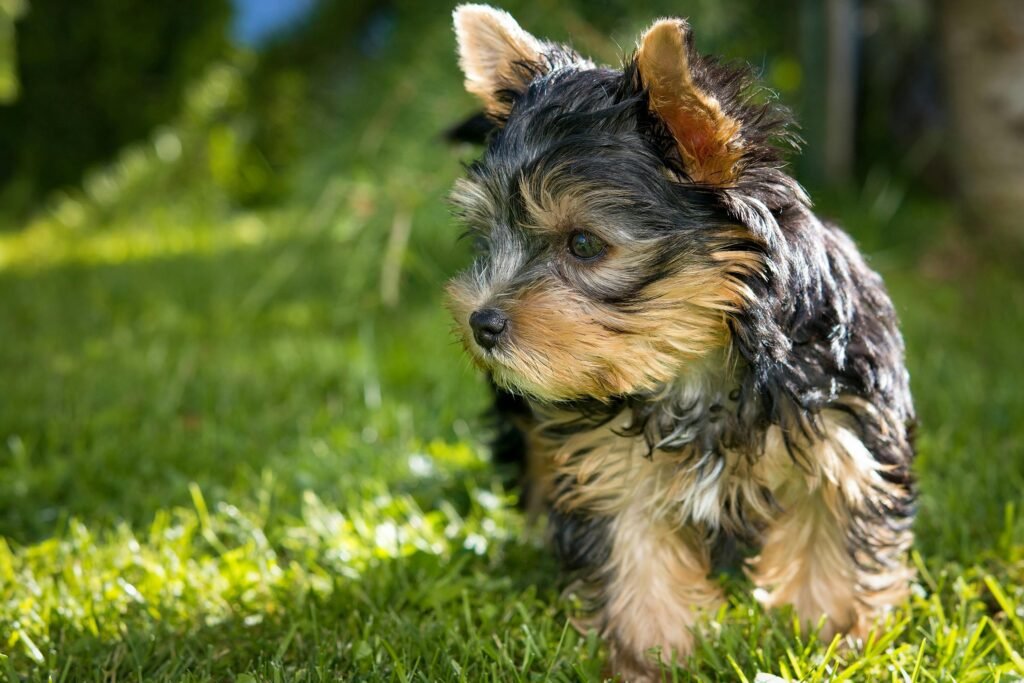
Dental Care
Dental care is particularly important for Yorkshire Terriers, as they are prone to dental issues like tartar buildup and gum disease. Daily brushing of their teeth with a dog-specific toothbrush and toothpaste helps prevent these problems.
Providing dental chews and toys can also aid in maintaining oral hygiene. Regular veterinary dental check-ups are crucial to identify and address any issues early.
Good dental care not only ensures a healthy mouth but also contributes to the overall well-being of your Yorkie, as dental diseases can lead to other health problems if left untreated.
Diet and Nutrition
A well-balanced diet is essential for keeping a Yorkshire Terrier healthy and energetic. Proper nutrition ensures they maintain a healthy weight, have a shiny coat, and live a long, happy life.
Understanding their specific nutritional needs, following recommended diet plans, and knowing which foods to avoid are key to providing optimal care for your Yorkie.
Nutritional Needs
Yorkshire Terriers require a diet rich in high-quality proteins, healthy fats, and essential vitamins and minerals to support their active lifestyle and small size. Protein is crucial for muscle development and repair, while fats provide energy and support skin and coat health.
Carbohydrates, though needed in smaller amounts, supply necessary energy for their daily activities. Additionally, ensuring they receive adequate vitamins and minerals, like calcium for bone health and omega-3 fatty acids for a healthy coat, is vital for their overall well-being.
Recommended Diet Plans
A balanced diet plan for a Yorkshire Terrier typically includes high-quality commercial dog food specifically formulated for small breeds. This ensures they get the right nutrients in the appropriate proportions.
Many Yorkie owners also choose to supplement their dog’s diet with fresh foods like lean meats, vegetables, and fruits. Portion control is essential, as overfeeding can lead to obesity and related health issues.
Dividing their daily food intake into two to three small meals can help manage their energy levels and digestion. Consulting with a veterinarian can help tailor a diet plan to meet the specific needs of your Yorkie.
Foods to Avoid
Certain foods are harmful to Yorkshire Terriers and should be avoided to prevent health issues. Foods like chocolate, grapes, raisins, onions, garlic, and anything containing xylitol are toxic to dogs.
Additionally, fatty and fried foods can lead to pancreatitis and other digestive problems. Avoid giving your Yorkie bones that can splinter, as they can cause choking or damage to their digestive tract.
Staying informed about which foods are safe and which are dangerous helps protect your Yorkie’s health and ensures they enjoy a long, healthy life.
Exercise and Activity Levels
Yorkshire Terriers, despite their small size, are energetic and require regular exercise to stay healthy and happy. Adequate physical activity helps maintain their weight, supports their cardiovascular health, and prevents behavioral problems.
Understanding their daily exercise needs, identifying suitable activities, and ensuring mental stimulation are all essential components of their care.

Daily Exercise Requirements
Yorkies need at least 30 minutes to an hour of exercise each day to keep them fit and active. This can be achieved through a combination of walks, playtime, and interactive games.
Regular exercise not only keeps them physically healthy but also helps channel their energy positively, reducing the likelihood of destructive behavior. It’s important to tailor the intensity and duration of exercise to your individual dog’s energy levels and age.
Suitable Activities and Games
Yorkshire Terriers enjoy a variety of activities that cater to their playful and curious nature. Daily walks are essential, but adding variety with activities like fetch, agility training, and interactive toys can keep them engaged.
Yorkies also love playing indoors with toys that stimulate their hunting instincts, such as squeaky toys and puzzle games. Ensuring a mix of physical activities and interactive play helps keep their exercise routine enjoyable and effective.
Importance of Mental Stimulation
Mental stimulation is just as important as physical exercise for Yorkshire Terriers. These intelligent dogs thrive on challenges that engage their minds. Puzzle toys, training sessions, and new experiences help keep their brains active and prevent boredom.
Mental stimulation can reduce stress and anxiety, promoting overall well-being. Incorporating activities that challenge their problem-solving skills and encourage learning can make a significant difference in their quality of life.
Training and Socialization
Training and socialization are essential aspects of raising a well-behaved and well-adjusted Yorkshire Terrier.
Consistent training techniques, early socialization strategies, and addressing common behavioral issues are all crucial for shaping your Yorkie into a polite and sociable companion.
Training Techniques
Yorkshire Terriers respond well to positive reinforcement training methods, which involve rewarding desired behaviors with treats, praise, or play. Consistency, patience, and firm but gentle guidance are key to successful training.
Breaking training sessions into short, frequent sessions helps keep your Yorkie engaged and focused. Basic obedience commands like sit, stay, and come are important foundations for further training and ensuring your Yorkie’s safety.
Socialization Strategies
Early socialization is vital for Yorkies to develop good manners and confidence around people and other animals. Introducing them to a variety of experiences, environments, and individuals from a young age helps prevent fearfulness and aggression later in life.
Puppy classes, visits to dog-friendly places, and supervised playdates with other dogs are excellent ways to socialize your Yorkie. Positive interactions during socialization lay the groundwork for a well-adjusted adult dog.
Common Behavioral Issues
Yorkshire Terriers may exhibit common behavioral issues like barking excessively, separation anxiety, and resource guarding. Consistent training and positive reinforcement techniques can address these issues effectively.
Providing mental stimulation and plenty of exercise can help alleviate boredom and reduce problem behaviors. Seeking guidance from a professional dog trainer or behaviorist can offer tailored solutions to specific behavioral challenges.
With patience, consistency, and proper training, many behavioral issues can be managed successfully, allowing your Yorkie to thrive as a happy and well-behaved companion.
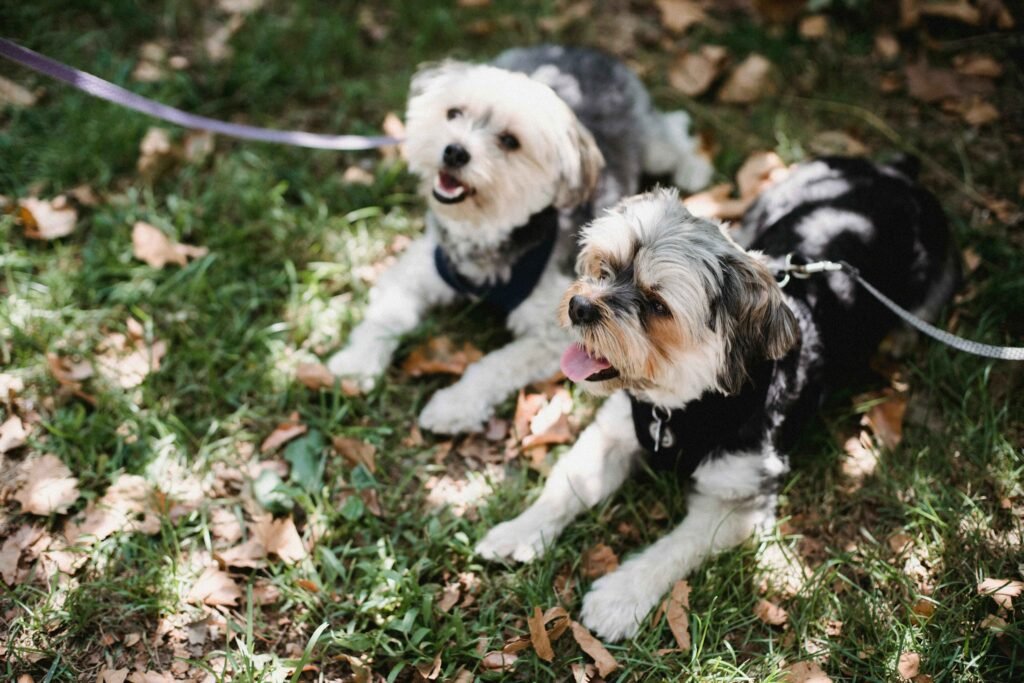
Living Environment
Creating a suitable living environment is crucial for the well-being of your Yorkshire Terrier. Understanding their needs, whether it’s ideal home settings, adapting to apartment living, or considering safety considerations, ensures they thrive in their surroundings.
Ideal Home Settings
Yorkshire Terriers thrive in homes where they receive plenty of attention and companionship. They do well in households with individuals or families who have the time and dedication to provide them with love and care.
A secure and comfortable indoor environment, with access to outdoor areas for supervised play and potty breaks, is ideal for Yorkies. They enjoy having their own cozy spot to retreat to, such as a soft bed or crate, where they can relax and feel safe.
Adapting to Apartment Living
Yorkshire Terriers are well-suited to apartment living due to their small size and moderate exercise needs. They adapt well to living in smaller spaces, as long as they receive regular opportunities for outdoor walks and play.
Providing indoor enrichment, such as interactive toys and puzzle games, helps keep them mentally stimulated in apartment settings. It’s important to establish a routine for potty breaks and exercise to ensure they get the physical activity they need while living in an apartment.
Safety Considerations
Ensuring a safe environment is paramount when caring for a Yorkshire Terrier. Yorkies are curious and adventurous, so it’s essential to puppy-proof your home by removing any potential hazards like electrical cords, toxic plants, and small objects that could be swallowed. Stair gates can prevent accidents, especially for young or elderly Yorkies.
Additionally, securing windows and doors prevents escape attempts, as Yorkies may try to explore outside if given the chance. Being vigilant and proactive about safety measures helps keep your Yorkie safe and secure in their living environment.
Breeding and Puppies
Understanding breeding practices and knowing what to expect when welcoming a Yorkshire Terrier puppy into your home are essential for responsible pet ownership. Selecting a reputable breeder ensures the health and well-being of both the puppies and their parents.
Breeding Practices
Responsible breeding practices prioritize the health, temperament, and conformation of the Yorkshire Terrier breed. Reputable breeders conduct health screenings on their breeding dogs to minimize the risk of hereditary diseases and genetic disorders in the puppies.
They also adhere to breed standards set by recognized kennel clubs to preserve the integrity of the breed. Ethical breeders prioritize the welfare of their dogs and puppies above all else, ensuring they are raised in a loving and nurturing environment.
What to Expect with Puppies
Welcoming a Yorkshire Terrier puppy into your home is an exciting and rewarding experience. Yorkie puppies are typically energetic, curious, and playful, requiring plenty of socialization and training from an early age.
They may go through a teething phase, so providing appropriate chew toys helps alleviate discomfort and prevent destructive chewing. Yorkie puppies thrive on routine and consistency, so establishing a structured schedule for feeding, potty training, and playtime is essential for their development.
Selecting a Reputable Breeder
When choosing a breeder, it’s crucial to research and select a reputable one who prioritizes the health and well-being of their dogs. A reputable breeder is transparent about their breeding practices, provides health clearances for their breeding dogs, and allows prospective buyers to visit their facilities and meet the puppies and parents in person.
They also offer guidance and support throughout the puppy’s life and are committed to finding the best possible homes for their puppies.
Avoid purchasing puppies from puppy mills or backyard breeders, as they often prioritize profit over the welfare of the dogs. By selecting a reputable breeder, you can ensure you’re bringing home a healthy and well-adjusted Yorkshire Terrier puppy.
Adoption and Rescue
Opting to adopt a Yorkshire Terrier from a rescue organization is a compassionate and fulfilling way to provide a loving home to a dog in need.
Understanding the differences between adoption and buying from a breeder, knowing how to find reputable rescue groups, and being prepared for what to expect from rescue dogs are all essential considerations for those considering adoption.
Adoption vs. Buying
While purchasing a puppy from a breeder is a common route for acquiring a dog, adoption offers the opportunity to give a second chance to a dog in need of a loving home. A
dopting a Yorkshire Terrier from a rescue organization typically involves a lower initial cost compared to buying from a breeder, and it provides a home for a dog who may have otherwise faced euthanasia or homelessness.
Additionally, adoption promotes responsible pet ownership by reducing the demand for puppies from commercial breeding facilities.
Finding a Rescue Group
Finding a reputable rescue group that specializes in Yorkshire Terriers is an important step in the adoption process. Researching local rescue organizations, checking online databases, and reaching out to breed-specific rescue groups can help you find available Yorkies in need of homes.
Reputable rescue groups conduct thorough evaluations of their dogs’ health and behavior, provide necessary medical care, and strive to match each dog with the most suitable adoptive family.
What to Expect from Rescue Dogs
Rescue dogs may come with a unique set of challenges, but they also bring immense joy and gratitude to their new families. Many rescue dogs, including Yorkshire Terriers, have experienced trauma or neglect in their past, which can manifest in behavioral issues such as anxiety, fearfulness, or separation anxiety.
However, with patience, love, and consistent training, rescue dogs can thrive in their new homes. Adopting a rescue dog is a rewarding experience that offers the chance to make a positive difference in the life of a deserving dog while gaining a loyal and grateful companion.
Traveling with a Yorkshire Terrier
Traveling with your Yorkshire Terrier can be a fun and rewarding experience, but it requires careful planning and consideration to ensure your pet’s safety and comfort throughout the journey.
Implementing tips for travel, prioritizing safety measures, and investing in essential travel accessories are key components of a successful trip with your Yorkie.
Tips for Travel
When traveling with your Yorkshire Terrier, it’s important to plan ahead and make necessary preparations. Before embarking on your journey, ensure your Yorkie is up-to-date on vaccinations and has a proper identification tag or microchip.
Pack essential supplies such as food, water, medications, and favorite toys to keep your pet comfortable during the trip. Additionally, familiarize yourself with pet-friendly accommodations and transportation options to ensure a smooth travel experience.
Safety Measures
Ensuring your Yorkshire Terrier’s safety is paramount when traveling. Use a secure and well-ventilated pet carrier or travel crate to transport your Yorkie in vehicles or airplanes.
Properly restrain your pet with a harness or seatbelt attachment to prevent injury in case of sudden stops or accidents. Avoid leaving your Yorkie unattended in vehicles, as temperatures can quickly rise to dangerous levels, leading to heatstroke or suffocation.
Travel Accessories
Investing in essential travel accessories can enhance your Yorkshire Terrier’s comfort and convenience during trips. Consider purchasing a travel-specific pet carrier that meets airline regulations and provides ample space for your Yorkie to stand, turn around, and lie down comfortably.
Bring along collapsible food and water bowls, portable litter boxes, and waste disposal bags to meet your pet’s basic needs while on the go. Additionally, pack familiar bedding or blankets to help your Yorkie feel secure and relaxed in unfamiliar environments.
Famous Yorkshire Terriers
Yorkshire Terriers have made their mark in both history and popular culture, with several notable Yorkies gaining fame in various fields.
From cherished pets of celebrities to characters in movies and television shows, these pint-sized pups have left a lasting impression on the hearts of many and have influenced pop culture in significant ways.
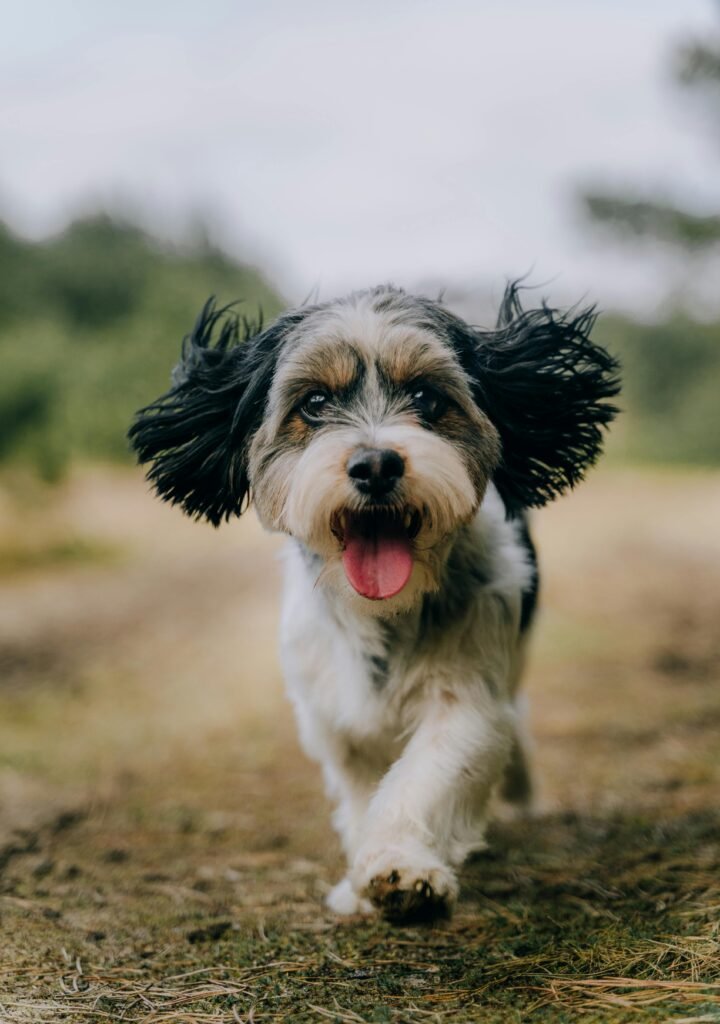
Notable Yorkies in History and Media
One of the most famous Yorkshire Terriers in history is Smoky, a World War II hero who served as a therapy dog and mascot for American troops in the Pacific Theater. Smoky’s bravery and intelligence earned her numerous accolades and cemented her place in military history.
In the world of entertainment, Yorkies have also made a splash, with iconic characters like Toto from “The Wizard of Oz” and Bruiser Woods from “Legally Blonde” capturing the hearts of audiences worldwide.
Influence on Pop Culture
Yorkshire Terriers have had a significant influence on pop culture, often portrayed as fashionable and glamorous companions to celebrities and socialites. Their small size, adorable appearance, and feisty personalities have made them popular subjects for memes, viral videos, and social media accounts.
Additionally, their presence in films, television shows, and advertisements has helped elevate their status as beloved pets and fashion accessories.
FAQs: Yorkshire Terriers
What is the average cost of a Yorkshire Terrier?
The average cost of a Yorkshire Terrier ranges from $1,200 to $3,000, depending on factors like pedigree, breeder reputation, and location.
Are Yorkshire Terriers hypoallergenic?
Yes, Yorkshire Terriers are considered hypoallergenic because they have hair instead of fur, which reduces the amount of dander they produce.
How much exercise does a Yorkshire Terrier need?
Yorkshire Terriers need at least 30 minutes to an hour of exercise daily. This can include walks, playtime, and interactive games.
Can Yorkshire Terriers be left alone?
Yorkies do not like being left alone for long periods and can suffer from separation anxiety. They thrive on companionship and regular interaction.
What is the best way to train a Yorkshire Terrier?
Positive reinforcement techniques, including treats, praise, and consistency, are the best ways to train a Yorkshire Terrier. Early socialization is also crucial.
Conclusion
The Yorkshire Terrier is a delightful breed with a rich history and a vibrant personality. Their small size belies their big heart and boundless energy.
Whether you’re looking for a loyal companion, a playful family member, or a stylish pet, the Yorkie might just be the perfect fit for you.
Remember, owning a Yorkie requires commitment and care, but the rewards are well worth it.





